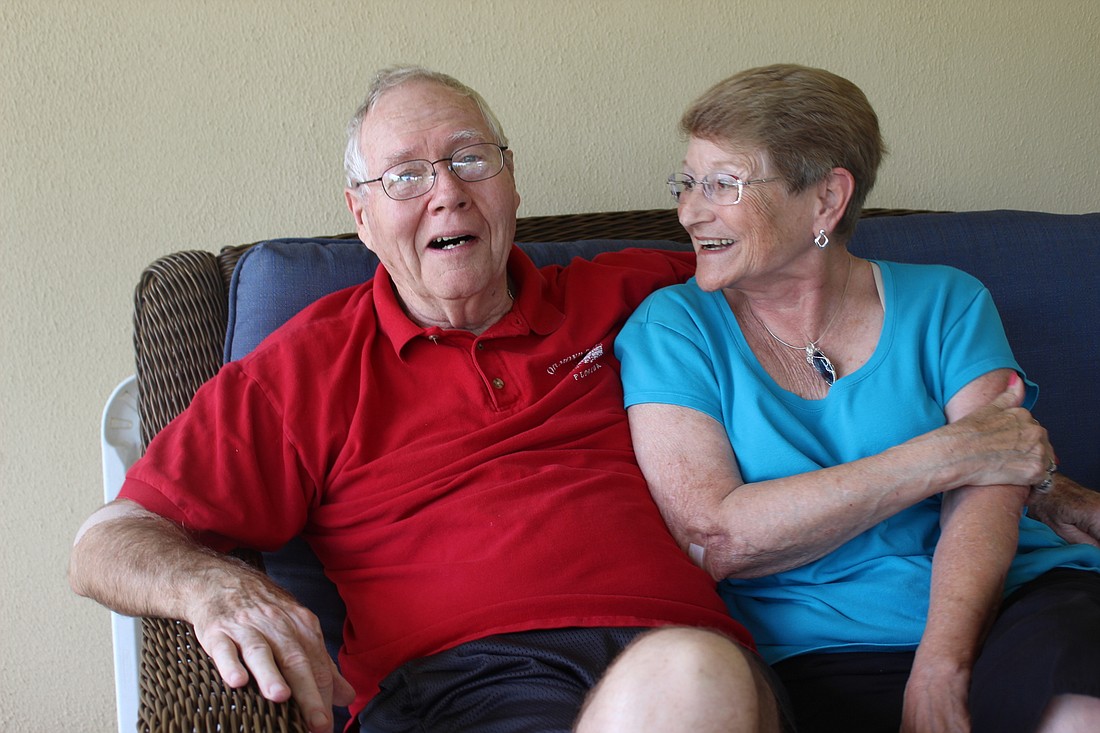- February 13, 2025
-
-
Loading

Loading

Every Friday night in Two Rivers, Wisconsin, all the cool kids would go to the youth center and dance, including Mary Ann and Tom Ward.
"He was hot stuff," she smiled, "And I was so, so cool."
Soon after meeting, the couple "went steady," for a year, and got married as soon as Mary Ann Ward graduated high school. Fifty-two years later, the Ormond Beach couple says they still have as much fun as they did when they were kids — even though Tom Ward has Alzheimer's and resides in an assisted living facility.
In 2007, Tom Ward suffered a stroke in his eye. The next morning he couldn't remember what he had for breakfast.
Though at first, Mary Ann Ward took care of her husband full-time, she moved him into The Sarah House — where the pair is known as "the love birds" — last year for her own mental health.
"I can concentrate on the positive," she said. "The negative isn't in my face all the time. We had a fantastic 52 years, and we're enjoying what we can out of what we have left."
In those 52 years, the active couple loved to boat, kayak, play racquetball and even hiked around Sedona for a few months with their golden retriever, AARP, a gift they gave themselves when they both retired.
"We've kept on having fun," she said, holding her husband's hand. "Now we go out to lunch, take a walk on the beach, or go to a museum. We laugh at the silliest things. He'll come up with something that will be so cognisant all of sudden."
One time, they were getting ready to leave for lunch when Mary Ann Ward made a comment that they would need to decide on what they wanted to eat. Tom Ward replied, "Let's have food."
"We're always poking fun at each other," she said, "And we can't say 'I love you,' enough."
Despite the fact that there are days where her best friend doesn't know who she is, Mary Ann Ward said she always finds reasons to be positive, because she has to be.
"If you dwell on being depressed and negative, it's so easy to fall into it," she said. "It's like putting on your old bedroom slippers. They feel good at the moment, but they're not good for your feet."
So as they celebrate their 53rd anniversary later this month, the couple will continue to chose to be positive about what they have no matter what their circumstances are.
"We all have choices," she said. "And it helps that we're each other's best friends."
Alzheimer's Awareness Month
June is Alzheimer’s and Brain Awareness Month, and according to the Alzheimer’s Association:
It is the sixth-leading cause of death among Americans, and is the only cause of death among the top 10 in America that cannot be prevented, slowed, or cured. Every 66 seconds, someone is diagnosed with Alzheimer’s disease.
Early diagnosis matters. A common misconception is that Alzheimer’s disease is normal aging. With an estimated half a million Floridians and over 5,000 Flagler County residents living with Alzheimer’s disease, studies show less than half have been diagnosed. Early diagnosis means families living with the disease can plan and build a solid support system.
Risks are higher among some more than others. African-Americans are about twice as likely as Caucasians to have Alzheimer's or another dementia. Hispanics are about one and a half times as likely; and more than two-thirds of Americans with Alzheimer’s disease are women – making women nearly two times as likely to get Alzheimer’s as men.
Alzheimer’s myths busted
The Alzheimer’s Association wants to correct some of the common myths about the disease: